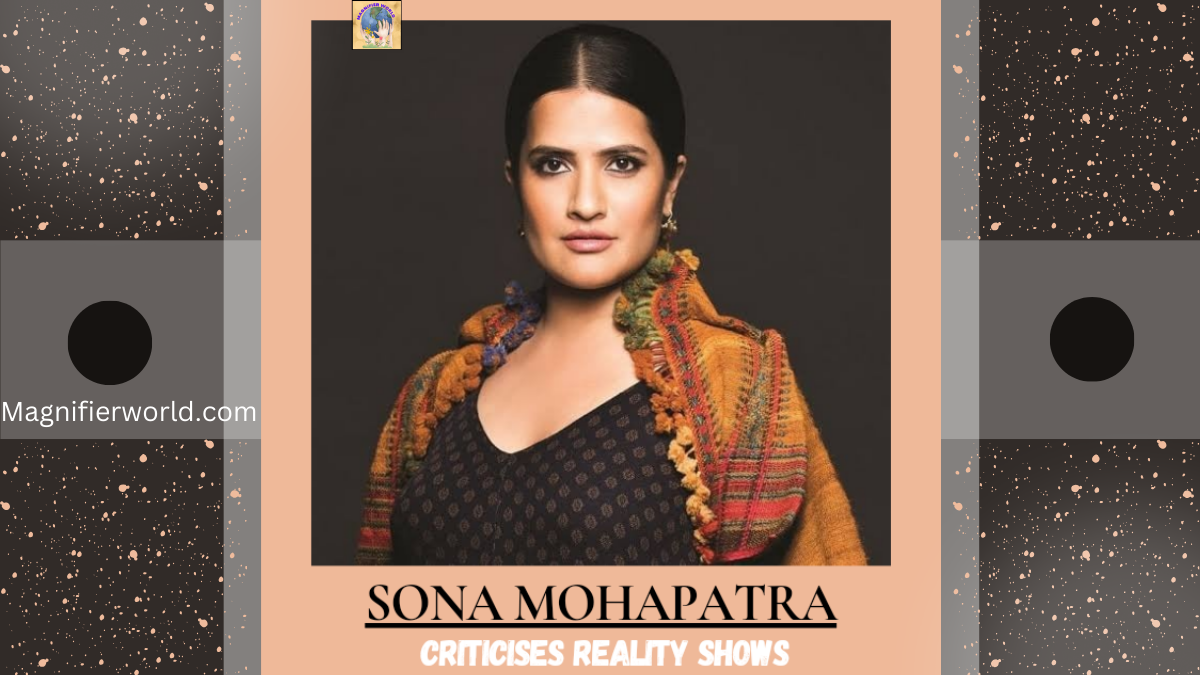Introduction: Sona Mohapatra’s Stand on Reality TV
Sona Mohapatra, the celebrated Indian singer known for her distinctive voice and impactful lyrics, has recently made headlines and criticises reality TV shows.
Her comments have sparked a significant conversation within the entertainment industry, challenging the norms and practices prevalent in these shows. Mohapatra’s critique delves into various aspects of reality television, highlighting concerns about its authenticity. Ethical considerations, and its impact on participants and viewers alike.
Key Takeaways from Sona Mohapatra’s Critique
- Authenticity Concerns: Mohapatra questions the genuine nature of reality TV, suggesting that much of what is presented is scripted or manipulated.
- Impact on Participants: She highlights the potential psychological and emotional toll on participants, who are often subjected to public scrutiny.
- Ethical Issues: Her critique touches on the ethical implications of exploiting personal stories and conflicts for entertainment.
- Viewer Influence: Mohapatra raises concerns about the impact of reality TV on viewer perceptions and societal norms.
- Industry Implications: Her comments may lead to broader discussions about the future direction of reality TV and its role in the entertainment industry.
Sona Mohapatra’s Perspective on Reality TV Authenticity
Criticism of Scripted Content
Sona Mohapatra’s critique primarily revolves around the authenticity of reality TV shows. She argues that many reality shows are not as spontaneous or genuine as they claim to be. Instead, there is a growing concern that these shows often involve scripted elements, where situations. As well as conflicts are orchestrated to enhance drama and viewer engagement. Mohapatra points out that this manipulation undermines the very essence of reality television, which is supposed to reflect real-life scenarios and emotions.
Influence of Editing and Production
Another aspect Mohapatra addresses is the role of editing and production in shaping the narrative of reality TV shows. The way footage is edited can significantly alter the perception of events and participants.
By selectively presenting certain moments while omitting others, the show’s producers can create a distorted version of reality. That does not accurately represent the participants’ true experiences or personalities.
Impact on Viewer Perception
The manipulation of content and editing not only affects participants but also influences how viewers perceive reality. Mohapatra argues that this can lead to a skewed understanding of real-life situations.
Fostering unrealistic expectations and misconceptions about people and events. The portrayal of exaggerated conflicts and drama can create a misleading view of reality, impacting societal norms and attitudes.
Participant Exploitation
A significant concern raised by Mohapatra is the potential exploitation of participants. Reality TV shows often place individuals in highly stressful and public situations, which can take a toll on their mental and emotional well-being.
Mohapatra emphasizes that the pressure to perform and the constant scrutiny from viewers can have detrimental effects on participants, leading to long-term psychological issues.
Calls for Reform
In light of these issues, Mohapatra advocates for reform within the reality TV industry. She suggests that there should be greater transparency and ethical considerations in how these shows are produced and presented. Sona Mohapatra criticises the reality shows for their overemphasis on sensationalism.
Ensuring that participants are treated with dignity and respect, and that the content is more reflective of reality, are crucial steps toward improving the integrity of reality television.
Ethical Concerns Surrounding Reality TV
Exploitation of Personal Stories
One of the major ethical concerns highlighted by Sona Mohapatra is the exploitation of personal stories and conflicts. Sona Mohapatra criticises the reality shows for their overemphasis on sensationalism.
Reality TV often delves into the private lives of individuals, using their personal struggles for entertainment purposes. This can lead to a violation of privacy and dignity, as participants may feel pressured to share sensitive details about their lives to fit the show’s narrative.
Commercialization of Emotional Distress
Mohapatra also criticizes the commercialization of emotional distress. Reality TV shows frequently capitalize on participants’ emotional experiences, turning their personal challenges into marketable content.
Sona Mohapatra criticises the reality shows for their overemphasis on sensationalism.
This monetization of suffering raises ethical questions about the respect and humanity extended to individuals who are used as entertainment fodder.
Impact on Society’s Values
The ethical implications of reality TV extend beyond the participants to the broader societal impact. Sona Mohapatra criticises the reality shows for their overemphasis on sensationalism.
By promoting sensationalism and conflict, these shows can influence societal values and attitudes. Mohapatra argues that this can contribute to a culture of exploitation and superficiality, where personal. As well as emotional experiences are commodified for viewer consumption.
Need for Ethical Standards
To address these concerns, Mohapatra advocates for the establishment of ethical standards within the reality TV industry. Sona Mohapatra criticises the reality shows for their overemphasis on sensationalism.
These standards would ensure that participants are treated fairly and that their stories are presented with respect and integrity. Implementing such measures could help in creating a more responsible and honest entertainment medium.
Role of Regulatory Bodies
The role of regulatory bodies in overseeing the production. As well as content of reality TV shows is another aspect that Mohapatra highlights. Sona Mohapatra criticises the reality shows for their overemphasis on sensationalism.
She suggests that stronger regulations and guidelines are needed to address ethical issues and protect participants. These bodies could play a crucial role in ensuring that reality TV adheres to ethical standards. As well as respects the dignity of all involved.
Viewer Influence and Societal Impact
Shaping Perceptions
Sona Mohapatra’s critique also touches on the impact of reality TV on viewers’ perceptions. Sona Mohapatra criticises the reality shows for their overemphasis on sensationalism.
The portrayal of exaggerated conflicts and personal dramas can influence how viewers perceive real-life situations and relationships. Mohapatra argues that this can lead to unrealistic expectations and distorted views of reality.
Promoting Sensationalism
The emphasis on sensationalism and drama in reality TV can promote a culture of superficiality. By focusing on controversy and conflict, these shows may encourage viewers to value entertainment over substantive content. As well as impacting their expectations and attitudes towards real-life issues.
Impact on Social Norms
Reality TV’s portrayal of certain behaviors and values can affect social norms and expectations. Sona Mohapatra criticises the reality shows for their overemphasis on sensationalism.
Mohapatra highlights that the normalization of certain attitudes or actions in reality shows can influence societal behavior, potentially reinforcing negative stereotypes and perpetuating harmful practices.
Educational Value vs. Entertainment
Another point Mohapatra raises is the balance between educational value and entertainment. Sona Mohapatra criticises the reality shows for their overemphasis on sensationalism.
While some reality shows may offer insightful content, many prioritize entertainment over educational value. This shift can lead to a focus on trivial or sensational topics rather than meaningful and informative content.
Encouraging Critical Viewing
To mitigate these effects, Mohapatra encourages critical viewing of reality TV. Sona Mohapatra criticises the reality shows for their overemphasis on sensationalism.
By being aware of the potential manipulation and sensationalism in these shows, viewers can develop a more informed perspective. As well as avoid being unduly influenced by the content presented.
Conclusion: The Path Forward for Reality TV
Sona Mohapatra’s criticism of reality TV highlights several critical issues concerning authenticity, ethical standards, and viewer influence. Sona Mohapatra criticises the reality shows for their overemphasis on sensationalism.
Her insights provide a valuable perspective on the need for reform and greater responsibility within the reality TV industry. Addressing these concerns involves a commitment to authenticity. Ethical production practices, and an awareness of the impact on both participants and viewers.
The future of reality TV may hinge on the industry’s ability to adapt and address these challenges. Sona Mohapatra often criticises the reality shows for their lack of genuine content.
By prioritizing ethical considerations and striving for genuine representation, reality TV can evolve to better serve its audience and participants. Mohapatra’s critique serves as a catalyst for necessary conversations about the direction of reality television. As well as its role in contemporary media.
FAQs
- What are Sona Mohapatra’s main criticisms of reality TV?
Mohapatra criticizes reality TV for its lack of authenticity, potential exploitation of participants, and the distortion of reality through editing and production.
- How does reality TV impact participants according to Mohapatra?
Participants often face emotional and psychological challenges due to the public scrutiny and stressful conditions, which can have long-term effects on their well-being.
- What ethical concerns does Mohapatra raise about reality TV?
She raises concerns about the exploitation of personal stories and emotional distress for entertainment, as well as the commercialization of participants’ struggles.
- What changes does Mohapatra advocate for in the reality TV industry?
Mohapatra advocates for greater transparency, ethical standards, and regulation to ensure that reality TV respects participants’ dignity and provides authentic content.
- How can viewers mitigate the influence of reality TV?
Mohapatra suggests that viewers should engage in critical viewing, be aware of potential manipulation, and focus on the educational value rather than sensationalism in reality TV shows.





